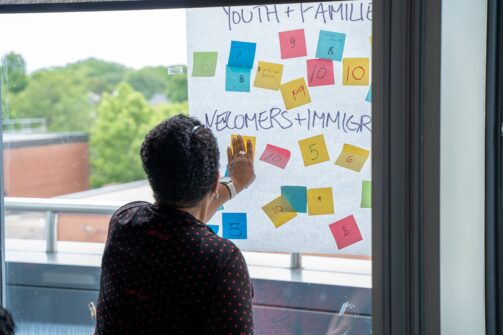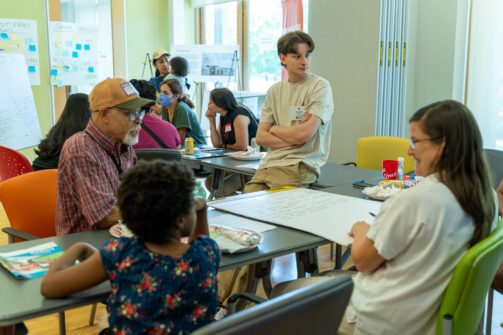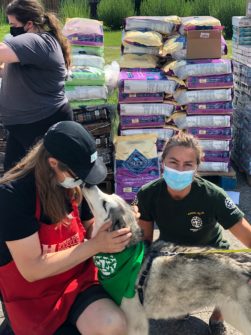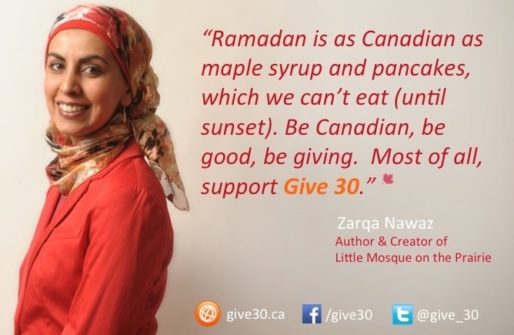Tag Archive: community engagement
-
-
Busting food bank myths with Feed Ontario!
Comments Off on Busting food bank myths with Feed Ontario!Busting food bank myths with Feed Ontario!
“Why don’t food bank users just get a job?”
“If we increase social assistance, won’t that make people not want to work?”
Food banks have been getting a lot of media attention due to the overwhelming demand for emergency food support. Unfortunately, a lot of misinformation is also being spread about what is causing this crisis.
In December, Feed Ontario hosted a panel discussion to bust some of these myths and misconceptions in our sector. We joined colleagues from food banks across the province to field questions pertaining to our work and the people who access our services.
Chiara Padovani, North York Harvest’s Senior Specialist, Advocacy and Community Engagement, joined the panel to tackle questions from Ontarians about who is really causing the housing crisis, the realities of living on social assistance, and the solutions desperately needed to reduce food bank use.
Watch the full panel below
Thank you to Feed Ontario for having us and thanks to our fellow panelists:
Myles Vanni – Inn of the Good Shepherd, Sarnia
June Muir – UHC -Hub of Opportunities, Windsor
Robbie Donaldson – Salvation Army – New Liskeard -
Food for Thought: Food banks need solutions, not scapegoats
Comments Off on Food for Thought: Food banks need solutions, not scapegoatsFood banks need solutions, not scapegoats
In our Food for Thought series, individuals within North York Harvest Food Bank will share their experience in matters pertaining to food insecurity and poverty. This series will share ideas, lessons learned, and challenge misconceptions as we work toward our vision of a community where all members are able to meet their food needs.
Written by Chiara Padovani; Senior Specialist, Advocacy and Community Engagement
I’ve been a food bank worker at North York Harvest for almost a decade. I have dedicated my life’s work to ensuring people in my community have enough food to eat: a basic human right that is needed in order for people to stay alive. I’m glad the crisis in food banks is getting attention, but I’d like to set the record straight.
Yes, there is a crisis in our food banks. Yes, there’s an affordability crisis in our city. But no, international students or immigrants are not to blame. Everyday, food banks encounter heartbreaking stories of people who through no fault of their own cannot manage to keep themselves and their families fed. They’re battling an impossible system that bears down on them every day with no reprieve. And every day I have to contend with the fact that I will never be able to fully solve the problems that they’re dealing with, I can only offer some food support so that they don’t go hungry.
Two months ago I met an international student, *Sharla, who came to our food bank for the first time and she was panicked. She said she had to cut
 the hours she was working in half because of a new immigration policy limiting how many hours international students can work. Suddenly out of nowhere, she had to survive on half her income and didn’t know how she could afford to pay the rent. In the same breath she asked me about volunteering at the food bank because now she can’t work full time.
the hours she was working in half because of a new immigration policy limiting how many hours international students can work. Suddenly out of nowhere, she had to survive on half her income and didn’t know how she could afford to pay the rent. In the same breath she asked me about volunteering at the food bank because now she can’t work full time.These are the people we’re told are taking advantage of our food banks? Or causing the affordability crisis? Give me a break. It’s scapegoating, and we don’t have to buy it. I will not sit silently while the work that I have been dedicating my life to has been weaponized to push an anti-immigrant and xenophobic narrative that does nothing to serve regular people who are struggling day to day, and only serves as a distraction from a broken economic system.
In fact, Sharla’s story sounds a lot like every other person’s story who comes through our doors whether they were born in Canada or not.
Here’s the truth: the affordability crisis we’re facing in Toronto and across the country has nothing to do with what country your neighbour, classmate or coworker was born in – and believing it does, is just a distraction from the real problem.
The number one reason people come to food banks is because they can’t afford their rent. Sharla isn’t raising your rent – your landlord is, and the provincial government isn’t just letting them get away with it, they’re making it easier by removing rent controls.
The largest group of new food bank clients are workers, which means even if you’re working full time, you still can’t afford the groceries you need. Sharla doesn’t cut your hours or pay you a wage you can’t afford to live on – your employer does, and the provincial government is incentivizing them to do so by refusing to legislate equal pay for part-time, casual, contract or temporary work.
Scapegoating immigrants, international students, migrants and refugees isn’t just a harmful distraction from the real problem, it also gets us further and further away from the solutions we actually need. Newcomers like Sharla are not the reason your rent is unaffordable, that the company you work for is extracting as much profit as they can without compensating you fairly, that grocery prices are too high, that formerly stable well-paying jobs are being replaced with temp labour. This is our fault, not theirs. We have enabled this system to thrive and to push our communities to the brink.
Because instead of implementing rent control to stabilize skyrocketing rents or implementing equal pay legislation to curb the rise of low-wage, precarious work – the kind of things that would help everyone and reduce the need for food banks in the first place – we’re being sold that the solution to our problem is just making life more difficult for Sharla?
I don’t buy it, and you shouldn’t either. Sharla deserves better than this, and so do we.
*Name changed to protect client privacy
-
Community Advocacy Group: Fighting poverty from the ground up!
Comments Off on Community Advocacy Group: Fighting poverty from the ground up!Community Advocacy Group: Fighting poverty from the ground up!
What do you think is the most important issue leading to food bank use? What could help solve that issue?
These were the questions we’ve been asking people who come to our food banks over the summer. We wanted to hear about the biggest challenges leading to food insecurity in our community from the people living it – and we wanted to hear what they think should be done about it too.
Over the past four months, hundreds of people shared their experiences at our local food banks, and over a hundred people attended one of five workshops to dive deeper into the issues.
Here’s what we learned:
- Housing and the cost of rent was consistently the biggest challenge in people’s lives. This is consistent with our research at NYHFB that shows that once people pay their rent they have very little – if any at all – to spend on food and other necessities.
- Food prices, wages, employment, social assistance rates and pensions were among the other top issues prevalent in people’s lives.
But we didn’t just discuss the challenges. We also talked about solutions and what we can do to make those solutions a reality, and that’s where things got really exciting. Despite all the challenges our community is facing, people are abundantly clear: not only are we ready for change but we’re ready to take action to make it happen!
That’s how our Community Action Group got started — a NYHFB Advocacy Group aimed at tackling the root causes of poverty and hunger from the ground up. Now, we’re getting ready to take action for real change and long-term solutions for our community. Together we’ll be fighting for rent control, affordable housing and food prices, fair wages, increased social assistance rates and more!
Interested in joining us? Contact pamela@northyorkharvest.com!

-
Pop-Up Shop for Pets In Partnership with the Humane Society of Canada
Comments Off on Pop-Up Shop for Pets In Partnership with the Humane Society of CanadaLast month, North York Harvest partnered with Humane Society International/Canada and Friends of HSI to hold a pet food pop-up at the Bathurst and Finch Community Food Space. The purpose of this event was to provide support to those in need of assistance in caring for their companion animals. Those impacted by the pandemic were offered free dog and cat food as well as treats and supplies for their pets.


“Since the start of the pandemic, our team’s focused mission has been to help keep pets in their homes. We have seen the unmistakable and often severe impact that COVID-19 has had on communities around Toronto and the rest of the province. We also know that the struggles and the lasting impact on people’s lives continues. We are grateful for this partnership with North York Harvest Food Bank as we join together to provide continued relief for people and their pets,” says Larysa Struk, Project Manager for the Ontario COVID-19 Animal Response Program at Friends of HSI.
Here at North York Harvest, we realize that for many individuals and families, pets have provided a much needed source of support, especially during the pandemic. At the same time, pet ownership is an added expense for many in our community. “With access to quality pet food and supplies, we are helping our community members ensure the well-being of their companions,” Henry Chiu, Director of Development & Marketing. “By partnering with the Humane Society International/Canada, we can further expand our existing support for pets which benefits the long-term health of all members of our community.”
-
Approach to COVID-19 Vaccination
Comments Off on Approach to COVID-19 VaccinationNorth York Harvest Food Bank’s approach to the COVID-19 pandemic is guided by our organizational responsibilities to workplace health and safety and our commitment to human rights. Just as we believe that all community members have a right to food, we believe that access to health care resources should be provided free from discrimination. Sadly, our collective experience with COVID-19 demonstrates that this is not the case. Community consultations conducted by Toronto Public Health “stated that COVID-19 has laid bare and exacerbated long-standing systemic inequities related to poverty, racism and other forms of discrimination” and that “inequitable access to the social determinants of health has provided favourable conditions for COVID-19 to spread in populations already marginalized by existing inequities, particularly Indigenous, Black, racialized and low-income communities”.[1] To state it bluntly, our community members are at disproportionate risk of contracting COVID-19 but not as likely to be able to access appropriate protections.[2]
As an organization, we have spared no expense to make our workplaces and food spaces safe, to protect the health of our workers and to maximize access to emergency food assistance in our community. We have committed to use guidance from public health experts as a minimum operating standard for all of our work. This approach extends to vaccines. While vaccinations provide individual protections from COVID-19, the primary goal of a vaccination campaign is to establish “herd immunity” whereby the majority of the population is immunized and COVID-19 can no longer spread.[3] Our community will not be safe until this threshold is met. As a result, North York Harvest Food Bank joins with Toronto Public Health to strongly encourage all Torontonians to get vaccinated if they are eligible to do so. While we acknowledge that vaccination is an individual choice and that people may have valid reasons for not receiving a vaccination, we strongly believe that choosing to be vaccinated is an important way that all eligible Torontonians can support our work and our community.
North York Harvest Food Bank will facilitate COVID-19 vaccinations in any way that we can. This includes using our food spaces to provide information and opportunities for vaccinations to our community members.
The availability of safe and effective vaccines provides us with a powerful tool to combat COVID-19. I thank you for your commitment as we lend our support to local vaccination campaigns.
Sincerely,

Ryan Noble
Executive Director
Additional Information on COVID-19 Vaccinations
Vaccine fact sheets from the government of Ontario
Information on the rollout of vaccines from Toronto Public Health
-
North York Harvest Launches 2021 Give 30 Campaign
Comments Off on North York Harvest Launches 2021 Give 30 CampaignSince 2012, Give 30 has been making a difference in communities nationwide, the United States and Australia. This grassroots movement was inspired by the Muslim faith’s Ramadan which takes place from April 13 until May 12, 2021. Regardless of of faith or background, everyone is encouraged to support partnering community organizations to fight hunger and food insecurity in our communities. This year, the campaign runs until August 31, which enables donors to extend their participation past the traditional 30-day campaign period. As a participating member agency, when you make a donation to Give 30 through North York Harvest Food Bank, your donation directly impacts the lives of families and individuals right here in your local community. By supporting one another, at times when we all need it most, we can each make a difference, together.
 Find out more about the values, and vision of Give 30 along how this important initiative began with a singular idea and inspiration. Interested in learning how you can connect with others who are also taking part in this global movement? Become a Give 30 Fan on Facebook and follow Give 30 on Twitter.
Find out more about the values, and vision of Give 30 along how this important initiative began with a singular idea and inspiration. Interested in learning how you can connect with others who are also taking part in this global movement? Become a Give 30 Fan on Facebook and follow Give 30 on Twitter.
